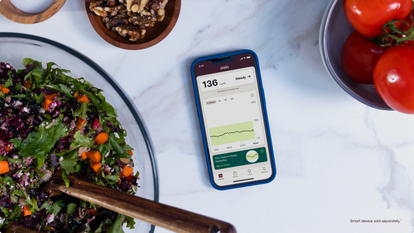Stress
Benefits of mindful eating for metabolic health
Published: Aug. 27, 2024
Updated: Aug. 21, 2025
6 min read

The content in this article should not be taken as medical advice. Please consult with your healthcare provider regarding your individual health needs.
Food can be so comforting. If you’re like many people, reaching for a piece of cake when you're feeling down or eating a bag of chips when you’re feeling overwhelmed is a go-to way to cope. Eating to soothe negative emotions or battle boredom is a common response many of us have.
While it might feel good in the moment, food is only a temporary fix. The negative emotions eventually return and lead us right back to the snack closet. This type of coping mechanism can cause a cycle of overeating and making less healthy food choices, which can lead to weight gain. Over time, these unhealthy habits can increase your chance of developing prediabetes or type 2 diabetes. Enter mindful eating: the practice of using your mind and body to fully enjoy eating. Mindful eating can provide benefits for your metabolic health and overall well-being, while helping you avoid overeating.
Physical vs. emotional hunger: know the difference
Sometimes hunger is your body’s way of telling you it needs fuel. But how do you tell the difference between physical hunger and emotional cravings? Physical hunger usually comes on gradually, at least a few hours after you’ve last eaten, and can be satisfied by a variety of foods. Emotional hunger happens regardless of when you last ate and may feel urgent. It often makes you crave specific foods. For instance, do you crave sugary treats when you’re feeling down or salty chips when you’re overwhelmed?
Pausing to think about your hunger can help you figure out if you really need fuel for your body, or if there’s something else that can satisfy your needs. Ask yourself: What do I want to eat and why do I want it right now? Assess how you’re feeling in that moment. If you're stressed, do something that relaxes you—take a walk, listen to a guided meditation, put on some calming music. If you’re bored, do something that occupies or entertains you.
Identify what triggers your food cravings
Feelings such sadness, anger, stress, fear, and boredom can trigger certain food cravings. Even specific situations like family or relationship issues and problems at work can cause us to eat foods that taste good but aren’t good for us. Triggers are different for everyone, so it’s important to think about what you’re feeling when you’re hungry.

A food journal can help you get a better idea of what your triggers are. Write down how hungry you are, what you eat, when and how much, and what you're feeling. Look for patterns and note situations that could be triggers. Do you tend to grab a bowl of ice cream after a particularly stressful day? Seeing your food habits in writing can be eye-opening and help you figure out where to make changes.
Mindful eating tips to help you kick the habit
Mindful eating can help you enjoy meals more and become aware of your body’s needs.
- One way to eat mindfully is to slow down. It takes about 20 minutes for your body to feel full, so take your time and enjoy every bite. Slowing down helps your brain catch up to your body so you can stop when your body says it’s full.
- Another good rule of thumb is that when you eat, just eat. Don’t eat in front of the TV or while scrolling on your phone. Focus on savoring your meal; enjoy the different textures, flavors, and smells of your food to make it a more satisfying experience that will leave you feeling satiated.
Find moments to practice mindfulness
In our fast-paced modern lives, finding ways to deal with stress is crucial to our health. Mindfulness can be a great tool for dealing with stress and other emotions that can lead to unwanted eating patterns.

Some mindful activities to try include journaling, exercising, meditating, reading, or connecting with a loved one. Next time you notice an emotional food craving, choose an activity from your mindful toolbox to help break the habit and cope with your feelings in a healthy way. It's also helpful to focus on regular mealtimes, balanced nutrition, consistent physical activity, and adequate sleep to help manage stress and feel your best.
Get the support you need
If you’re struggling with negative eating patterns or mental health, know that you aren’t alone. Ask your healthcare provider about support groups or search online for groups in your area. Mental Health America also offers many different types of support groups and other helpful resources. Consider therapy with a mental health professional who can help you better understand your relationship with food, assess if you have an eating disorder, and help you develop an individualized plan.

Curated & reviewed by: Kayce Sol
MA, RN, BSN, CDCES
MA, RN, BSN, CDCES
Kayce Sol is a registered nurse and certified diabetes care and education specialist.
